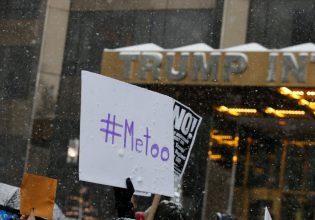
Predator Scandal: Lavranos, Bitzios and Dimitriadis risk losing visas for travel to US
Washington is stepping up sanctions on companies and individuals involved in a scandal revolving around the illegal spyware Predator
Spotlight
-

Πώς «ψάρευαν» ανήλικους πελάτες οι ναρκέμποροι στην Πάτρα - Έκρυβαν ναρκωτικά και ζυγαριές σε σχολείο
-

Τι σημαίνει για το κίνημα του #MeToo η ανατροπή καταδίκης του Γουαϊνστάιν;
-

Η φωτογραφία του Καρόλου με την Καμίλα - Πρώτη ανακοίνωση του Μπάκιγχαμ μετά τη διάγνωση με καρκίνο
-

Το να είσαι «άσχημος» θα είναι μια μέρα της μόδας;
US Secretary of State Antony Blinken on Tuesday announced that the US State Department will impose visa restrictions – for travel to the United States – on individuals involved in misusing commercial spyware software.
In announcing the visa restriction policy, which the State Department described as an effort to promote accountability for the misuse of commercial spyware, Blinken noted that:
“The United States remains concerned with the growing misuse of commercial spyware around the world to facilitate repression, restrict the free flow of information, and enable human rights abuses. The misuse of commercial spyware threatens privacy and freedoms of expression, peaceful assembly, and association. Such targeting has been linked to arbitrary detentions, forced disappearances, and extrajudicial killings in the most egregious of cases. Additionally, the misuse of these tools presents a security and counterintelligence threat to U.S. personnel. The United States stands on the side of human rights and fundamental freedoms and will continue to promote accountability for individuals involved in commercial spyware misuse.”
In any case, the United States has stepped up efforts to restrict the use of such software, through initiatives such as the «Joint Statement on Efforts to Counter the Proliferation and Misuse of Commercial Spyware”, and the US President’s Executive Order, called “Prohibition on Use by the United States Government of Commercial Spyware that Poses Risks to National Security.”
When the US administration refers to commercial spyware abuse, it also refers to the Predator software and companies like Cytrox and Intellexa. After all, since last June, Washington has officially placed these foreign companies to the “Entity List”, which includes all companies, organizations and individuals considered to be a threat to America’s national security or US foreign policy interests.
‘Black list’ of companies, individuals
Individuals involved in the production, distribution and use of such surveillance software will now be listed on this so-called “black list”, essentially a catalogue of those considered as possible threats to the United States.
This is because, based on the State Department’s announcement, involved individuals may be subject to restrictions on their ability to obtain a visa for travel to the United States. This is based on a provision of US federal law which states that «…Foreign nationals may be inadmissible if granting the foreign national a visa would cause potentially serious adverse foreign policy consequences for the US.”
Specifically, visa restrictions can be imposed, according to the announcement by the US Department of State, in the following case:
“This visa restriction policy is pursuant to Section 212 (a)(3)(C) of the Immigration and National Act, and allows the Department of State to implement visa restrictions for (1) individuals believed to have been involved in the misuse of commercial spyware, to target, arbitrarily or unlawfully surveil, harass, suppress, or intimidate individuals including journalists, activists, other persons perceived to be dissidents for their work, members of marginalized communities or vulnerable populations, or the family members of these targeted individuals; (2) individuals believed to facilitate or derive financial benefit from the misuse of commercial spyware described in prong (1) above, including but not limited to developing, directing, or operationally controlling companies that furnish technologies such as commercial spyware to governments, or those acting on behalf of governments, that engage in activities as described in prong (1) above; and (3) the immediate family members of individuals subject to the restrictions in prongs (1) and (2) above. For purposes of this policy, “immediate family members” include spouses and children of any age.”
The phrasing of the announcement and the reference to «individuals believed to be» make it clear that it does not refer to conclusive judicial decisions but also to individuals who may be suspects, under surveillance, or involved in such abuse of spyware, including their spouses or children.
This means that individuals being investigated or their potential involvement in the case of illegal surveillance in Greece has been discussed, namely the Predator eavesdropping scandal, could be denied visas by U.S. authorities to avoid potential serious negative consequences for U.S. foreign policy.
It could reasonably be assumed that businessmen Felix Bitzios and Yiannis Lavranos could be included in this category, who were both involved in the trade of this software, potential employees of the Greek Intelligence Agency (EYP) involved in its use, the officials who granted Intellexa an export license for the illegal spyware, as well as the then chief of staff to the prime minister, Grigoris Dimitriadis, for whom there are numerous news articles citing evidence of his involvement in this case through institutional links between the Maximos Mansion and the EYP (Greek Intelligence Service), as well as through the «triangular» relationships between these companies, these businessmen, and the government. And of course, the issue is not whether they will be able to travel or not, but that for the US, individuals involved in the abuse of such spyware are treated as individuals who can cause «potentially serious adverse consequences for US foreign policy.»
The Greek ‘exception’
All this shows that not only in Europe, where the issue of illegal spyware use against citizens, politicians, and journalists has been extensively discussed, especially in the European Parliament, as it is considered a fundamental aspect of the violation of the principles of the rule of law in countries like Greece, but also in the US, the issue of surveillance is taken very seriously, and efforts are made to take measures to limit the use of such commercial spyware.
On the contrary, an exception to this rule is our country, where essentially nothing is being done.
Apart from an ongoing judicial investigation into the case, the proceedings of the parliamentary committee were handled by the government majority in a way that contributed to covering up the case rather than revealing it, as it was decided that more or less «nothing happened.» The government treats the issue as practically «closed,» and does not take substantive measures on how to ensure real protection of communication privacy, while instead of providing explanations as to whether he is involved in this case or not, Mr. Dimitriadis is only filing SLAPP lawsuits against journalists and media outlets raising legitimate questions about his involvement.
Ακολουθήστε το in.gr στο Google News και μάθετε πρώτοι όλες τις ειδήσεις













































 Αριθμός Πιστοποίησης Μ.Η.Τ.232442
Αριθμός Πιστοποίησης Μ.Η.Τ.232442